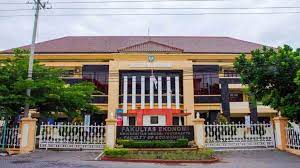SEJARAH
The history of the establishment of the Department of Administrative Education, Faculty of Economics, Universitas Negeri Yogyakarta, of course, cannot be separated from the history of the establishment of Universitas Negeri Yogyakarta (UNY). Before becoming UNY, it was known as the Yogyakarta Teacher Training and Education Institute (IKIP). IKIP Yogyakarta as one of the Educational Personnel Education Institutions (LPTK) was established on May 22, 1963 based on the Decree of the Minister of Higher Education and Science (PTIP) No. 55 of 1963. One of the faculties is the Faculty of Social Sciences Teaching (FKPS) which was inaugurated by the minister of PTIP dated May 21, 1964. This decision was confirmed by Decree of the President of the Republic of Indonesia Number 268 of 1965, dated September 14, 1965.
In order to strengthen the function of teaching in the field of Social Sciences, the Chancellor of IKIP Yogyakarta issued a decree No. 05 of 1965 which contained, among other things, changing the name of FKPS to Faculty of Social Sciences Teacher Training (FKIS). To emphasize the characteristics of education, based on the Decree of the President of the Republic of Indonesia No. 54 of 1982 dated 7 September 1982 regarding the organizational structure of the Yogyakarta IKIP FKIS changed to the Faculty of Social Sciences Education (FPIPS).
In line with the development of Science, Technology and the Arts (IPTEKS) and the demands of the world of work, IKIP Yogyakarta was developed into Universitas Negeri Yogyakarta (UNY) based on the Decree of the President of the Republic of Indonesia Number 93 of 1999, dated August 4, 1999. This was followed by a change in the name of the faculty within UNY. FPIPS changed to FIS, which was ratified based on the Decree of the Minister of Education and Culture No. 274/0/1999 concerning the Organization and Work Procedure of UNY. With the change of name, FIS has the authority to organize teaching and non-teaching study programs.
Changes and development efforts continue to be made to meet the demands of the community. Therefore, it is proposed to change the name of FIS to the Faculty of Social and Economic Sciences (FISE). Based on the Regulation of the Minister of National Education of the Republic of Indonesia Number 12 of 2006 concerning Amendments to the Decree of the Minister of Education and Culture Number 274/O/1999 concerning the Organization and Work Procedure of Universitas Negeri Yogyakarta, FIS changed to the Faculty of Social and Economic Sciences (FISE).
In order to meet the demands of the development of the world of work, FISE has developed into two faculties, namely FIS and FE based on the Regulation of the Minister of National Education Number 23 of 2011 concerning Organization and Work Procedures of UNY on June 22, 2011. Thus, June 22, 2011 is set as the date of birth of the Faculty of Economics. Universitas Negeri Yogyakarta.
Previously, the Department of Administrative Education was under the auspices of the Faculty of Social Sciences, but based on the Decree of the Chancellor of the Universitas Negeri Yogyakarta Number: 523 of 2012 concerning the Ratification of the Transfer of the Department of Administrative Education, the Office Administration Education Study Program (S1) and the Secretarial Study Program (D3) from the Faculty of Social Sciences to the Faculty Economics Universitas Negeri Yogyakarta dated August 9, 2012, Effective September 2, 2012, the Office Administration Education Study Program (S1) and Secretarial Study Program (D3), Faculty of Social Sciences moved to the Faculty of Economics, Universitas Negeri Yogyakart.
LAB
| Gambar | Keterangan |
|---|---|
OFFICE SIMULATION LABORATORY
|
|
 |
OFFICE TECHNOLOGY LABORATORY |
 |
TYPING LABORATORY
|
 |
DIGITAL ARCHIVERY LABORATORY
|
PROGRAM STUDI
Vision
-
Carry out educational learning to form graduates who are committed to developing and applying office administration education.
-
Conducting studies on development and application in the field of office administration education to contribute to community building at the local, national, regional, and global levels.
-
Carry out community service in the field of office administration education and develop partnerships with schools, industry, government, and the community.
-
Organizing good, clean, transparent, and accountable governance of the Office Administration Education Study Program.Goals
-
Produce graduates in the field of Office Administration Education who are devoted, independent, and intellectual.
-
Produce quality research that is useful for community development and science and technology in the field of Office Administration Education.
-
Produce community service activities as a form of social responsibility in the field of Office Administration Education.
-
Realizing synergistic cooperation with other institutions both at home and abroad in the field of Office Administration Education.
-
Realizing the governance of the Office Administration Education Study Program that is good, clean, transparent, and accountable.
The development of the Office Administration Education Study Program (S1) is inseparable from the reference to various policies and standards that are adapted to the characteristics of higher education and the needs of the world of work in the office administration field. The scope of higher education standards is wider than the standards set out in the Government Regulation of the Republic of Indonesia Number 19 of 2005 concerning National Education Standards. Presidential Regulation of the Republic of Indonesia Number 8 of 2012 concerning the Indonesian National Qualifications Framework (KKNI) provides guidelines that the development of study programs must be directed to the learning outcomes of graduates according to the field of expertise. Regulation of the Minister of Education and Culture of the Republic of Indonesia Number 73 of 2013 mandates the implementation of the IQF in the scope of higher education.
KKNI is one of the national references to improve the quality and competitiveness of the Indonesian nation in the human resources sector. Achievement of the qualifications of Indonesian human resources is produced through the national education and job training system, as well as the assessment system for equality of learning outcomes. Improving the quality and competitiveness of the nation will simultaneously strengthen the identity of the Indonesian nation. There are two keywords to link the curriculum with the IQF, namely learning outcomes and qualifications. Packaging learning outcomes into the IQF qualification level is very important for the purpose of matching and equalizing qualifications and/or recognition between education levels and/or employment levels. In addition, packaging learning outcomes into the IQF is also important for the purposes of harmonization and cooperation, mutual recognition of qualifications with other countries, both bilaterally and multilaterally.
The Office Administration Education Study Program (S1) has implemented several curriculum phases, namely the 2014 Curriculum, the 2019 Curriculum, the 2020 MBKM Curriculum. The curriculum change phase is evaluated in stages by academics, practitioners, graduate users, alumni, students, stakeholders, professional associations who are members of the Association of Graduates and Practitioners of Indonesian Office Administration (ASPAPI), and at the direction of the leadership to adjust to the policy direction of the Ministry of Education, Culture. , Research, and Technology related to the implementation of the Independent Learning Campus Curriculum (MBKM). Curriculum review is carried out by first brainstorming from industry to find out the skills needs of graduates, then reviewing and evaluating graduate learning achievements in the curriculum that has been prepared to be synchronized with the needs of graduates in accordance with the needs of the world of work and the demands of future competency skills in the office sector. Thus, curriculum development in the Office Administration Education Study Program is based on the following policies:
-


 MASUK PTN
MASUK PTN